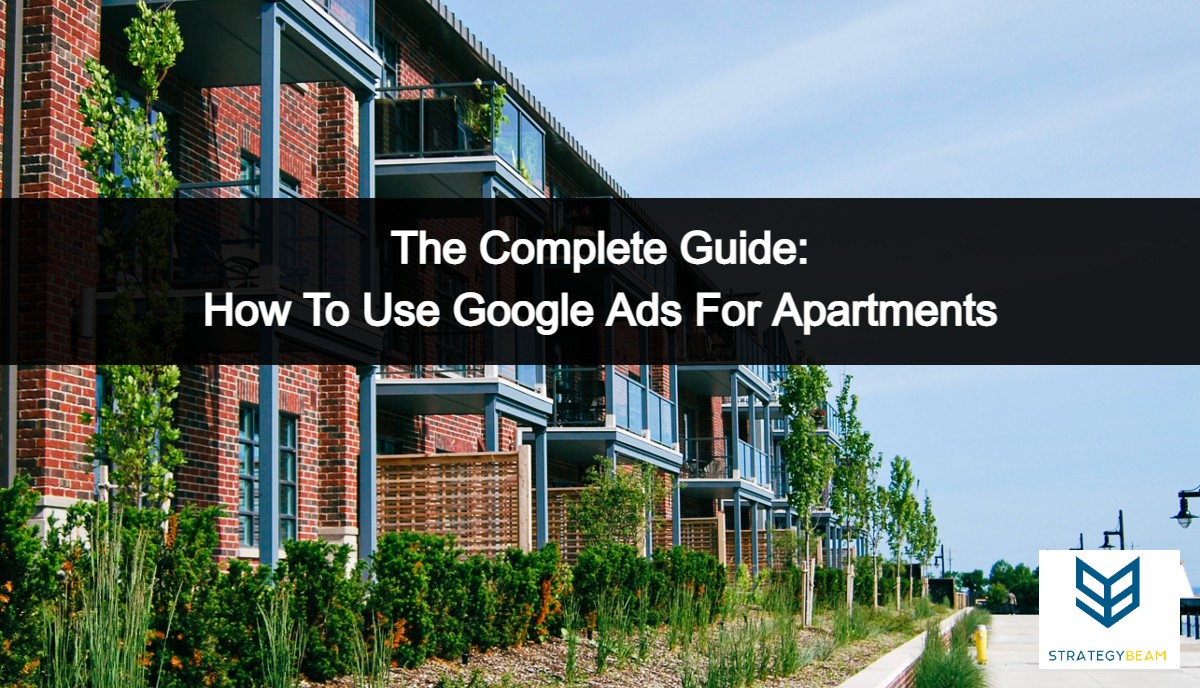
As a property owner or manager, filling vacancies and leasing up your apartments can sometimes feel like an uphill battle.
Whether you are concerned about pre-leasing for a new apartment community you are building or trying to stabilize an existing property, you need a way to hit your breakeven occupancy rate as quickly as possible throughout the year.
Multifamily marketing is an essential part of your property’s success. Everyone from property managers and asset managers to real estate investors need to consider their lease-up marketing plan to ensure the financial success of the property.
Suppose you are unsure how to get your property noticed online. In that case, you should continue reading to learn if Google Ads for small business is the right option to help you attract and engage potential tenants, ensuring your vacancies are filled in no time.
The unique challenges of apartment real estate marketing
As a property manager, asset owner, or investor, it’s important to understand your lease-up schedule. Navigating the competitive world of property marketing can be daunting, with unique challenges requiring creative solutions.
Throughout the years, we have noticed that property managers and front office staff struggle with multifamily marketing for various reasons, but the most common issues you likely face include:
- Vacancy rates: A persistent issue for property managers, owners, and investors is maintaining low vacancy rates. Google Ads allows you to target specific audiences actively searching for apartments, reducing vacancies by connecting you with prospective tenants.
- Geographic targeting: Attracting renters in your property’s vicinity can be challenging. Google Ads offers precise geotargeting options, enabling you to focus your marketing efforts on the most relevant locations, increasing the likelihood of local renters discovering your apartments.
- Seasonal demand: The rental market often experiences fluctuations, with peak seasons and slower months. Google Ads allows you to adjust your campaigns according to to seasonal demand so you can target the specific needs of potential tenants at specific times throughout the year.
- Rental pricing: Setting competitive rental prices is vital to attract the right tenants in your city. By analyzing market data and utilizing Google Ads’ keyword planner tool, you can determine the optimal price point for your property, keeping it attractive and relevant in the market.
- Competition: In a saturated market, standing out from the crowd can be tough. With Google Ads, you can target specific keywords and demographics to reach potential tenants searching for properties like yours, giving you the edge over your competitors.
- Brand awareness: Building trust and recognition in your target audience is crucial. Google Ads helps you achieve this by showcasing your properties through engaging ad formats, such as display and video ads, which can boost brand awareness and credibility.
Now that we have a basic understanding about the unique challenges you face as you try to market your multifamily property, let’s take a look at whether apartment ads through Google is a good option for your apartment marketing strategy.
Should I create apartment ads with Google?
Google Ads can play a pivotal role in helping you achieve that. The platform allows for unparalleled targeting, enabling you to hone in on your ideal tenant demographic, ensuring your marketing efforts are focused and effective.
Google Ads offers a cost-effective solution with its pay-per-click (PPC) model, meaning you only pay when someone clicks on your ad, resulting in more control over your marketing budget.
Here are just a few benefits that Google Ads can support your apartment marketing strategy:
- Precise targeting: Google Ads allows you to reach your ideal tenant demographic by targeting specific keywords, locations, and audience interests, ensuring your marketing efforts are focused and effective.
- Cost-effective solution: With its pay-per-click (PPC) model, you only pay when someone clicks on your ad, giving you more control over your marketing budget and maximizing your return on investment (ROI).
- Increased visibility: By appearing at the top of Google search results, your property gains more exposure to potential tenants actively searching for apartments, boosting your chances of attracting high-quality leads.
- Real-time data & analytics: Google Ads provides valuable insights into your campaigns’ performance, enabling you to make data-driven decisions, optimize your ads, and improve overall effectiveness.
- Competitive advantage: Utilizing Google Ads in your apartment marketing strategy helps you stay ahead of the competition by leveraging cutting-edge technology to reach your target audience and convert leads into tenants.
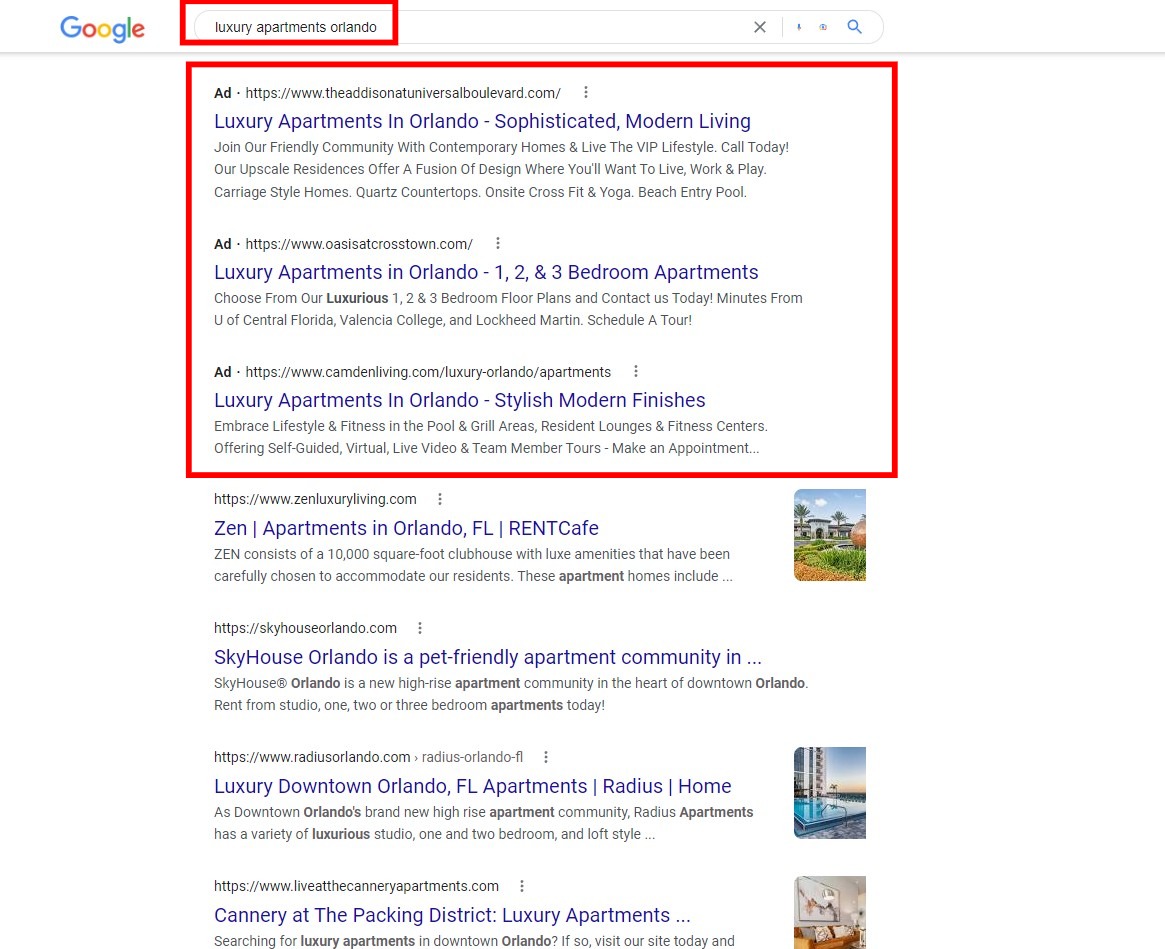
By incorporating Google Ads into your apartment marketing strategy, you’re not just investing in a tool but in a comprehensive approach to reaching your target audience. It is important to note that Google Ads can be a sizable investment, and you risk wasting your money if you don’t know what you are doing.
This is why it is highly recommended that you speak with an outsource PPC agency to help you set up and run your campaigns if you are not 100% sure about what you are doing.
Google Ads limitations for apartment marketing
In the previous sections, we looked at some of the unique challenges of apartment marketing and how Google Ads can help you create and show your property through apartment ads.
The list could go on, but the bottom line is that you need a marketing strategy that provides consistent results when used properly.
Apartment ads through Google Ads is a great tool to help you achieve this goal. But it is important to note that Google has introduced a range of limitations on Google Ads for apartment marketing to promote fair practices across the industry and protect users as they hunt for a new apartment.
Here are some of the most important limitations you should consider as you consider launching apt ads for your property through Google Ads.
Housing policy restrictions
In recent years, Google has implemented housing policy restrictions to prevent discriminatory practices. These policies prohibit targeting ads based on demographics such as age, gender, parental status, marital status, or zip code.
While these restrictions promote fair housing practices, they also limit the granularity of audience targeting for apartment marketers.
Limited use of remarketing
Remarketing is a powerful feature that allows advertisers to display ads to users who have previously visited their website. However, Google’s housing policy restricts the use of remarketing in the apartment marketing industry.
This limitation means apartment marketers may miss out on valuable opportunities to re-engage potential tenants who showed initial interest.
Restrictions on call-only ads
Google Ads has tightened its rules around call-only ads, now requiring that the phone number displayed in the ad matches the number on the associated landing page.
For apartment marketers managing multiple properties or utilizing call centers, this limitation makes it more challenging to implement effective call-only campaigns.
Verification requirements for location extensions
Location extensions, which display your property’s address and a map marker alongside your ad, are an excellent way to promote your apartment.
However, Google has implemented stricter verification requirements requiring advertisers to have a verified Google My Business listing for each location. This process can be time-consuming and may delay the launch of location-based campaigns, but this feature can be beneficial once appropriately implemented.
Restrictions on ad copy and imagery
Google Ads enforces strict ad copy and imagery guidelines to ensure a positive user experience. Ads containing misleading or inappropriate content, including false claims or offensive images, are disallowed.
While these guidelines maintain a high-quality advertising ecosystem, apartment marketers may also require additional time and effort to create compliant ads.
7 ways to use Google Ads to amplify property listings
As any property manager or apartment staff can attest to, apartment marketing landscape is intensely competitive, and standing out can feel like an impossible task. But with Google Ads, you can effectively target your audience, boost your visibility, and ultimately drive conversions.
Let’s take a look at 7 effective ways to leverage Google Ads to amplify your apartment marketing.
1. Understand the needs of your audience
As an apartment owner or manager, understanding the needs of potential tenants is paramount to crafting a successful Google Ads campaign for your apartment marketing strategy.
Once you understand what your audience looks for and how they search for an apartment, you can create highly targeted ads that resonate with them. Here are some elements that you should consider as you build apartment ads to meet the needs of your audience:
- Location and accessibility: Potential tenants prioritize finding an apartment in a desirable area, close to work, schools, or public transportation. Emphasize the advantages of your property’s location in your Google Ads campaigns to attract renters searching for convenience.
- Affordability: Renters seek apartments that fit within their budget, including utility costs and additional fees. Highlight your ads’ competitive pricing, rent specials, or inclusive utilities to appeal to budget-conscious searchers.
- Amenities & features: Modern appliances, in-unit laundry, fitness centers, and pet-friendliness are among the top amenities renters look for. Showcase your property’s unique amenities in your ads to stand out from competitors, entice prospective tenants to click on your ads, and schedule a tour with your team.
- Safety & security: Renters value a secure living environment with features such as gated communities, 24/7 security, or surveillance cameras. Emphasize the safety aspects of your property in your Google Ads to attract security-conscious renters.
- Community & lifestyle: Prospective tenants often seek a sense of belonging and a vibrant community. Promote community events, shared spaces, or neighborhood attractions in your ads to connect with renters searching for a welcoming and engaging living experience.
Understanding the needs of your potential tenants is crucial to the success of your apartment marketing strategy using Google Ads. By tailoring your approach to their specific requirements, you’ll be better positioned to attract quality leads and maximize your return on investment.
2. Strategic campaign and ad group setup
Setting up strategic campaigns and ad groups in Google Ads is the foundation of a successful apartment marketing strategy. Campaigns are essentially the high-level organization of your ads, while ad groups are subcategories within campaigns, allowing you to create tailored ads for specific target audiences.
Apartment property managers and staff need to set up their Google Ads campaigns in a way to ensure they have long-term success. You can bid on the best keywords and have great ad copy, but if your campaigns and ad groups are not set up properly then your account will not have continued success.
Here are some tips for Google Ads to keep in mind as you structure your account with unique campaigns and ad groups:
- Define clear objectives: Set specific, measurable goals for each campaign, such as increasing leads, driving more website traffic, or improving brand awareness. This will guide your ad group creation and ad development.
- Segment by location: Create separate ad groups targeting different geographic areas, such as nearby neighborhoods or cities, to personalize ad copy and cater to local search trends, like “apartments near [local attraction].”
- Target relevant keywords: Research keywords that potential tenants are likely to search for, like “pet-friendly apartments” or “luxury apartments,” and build ad groups around these themes to ensure your ads are relevant and attractive.
- Utilize negative keywords: Identify and exclude irrelevant search terms that could trigger your ads, such as “apartment furniture” or “apartment painting,” to prevent wasting the budget on clicks that won’t convert.
- Test & optimize: Continually monitor ad performance, experiment with different ad copy and keyword variations, and adjust bids and targeting to optimize your campaigns and ad groups, ensuring the best possible results for your apartment marketing efforts.
3. In-depth keyword research
Keyword research is the cornerstone of any successful Google Ads campaign, especially in apartment marketing. It’s identifying and analyzing search terms that potential tenants use when looking for apartments.
Understanding these search behaviors allows you to tailor your ad campaigns to target the most relevant and valuable keywords.
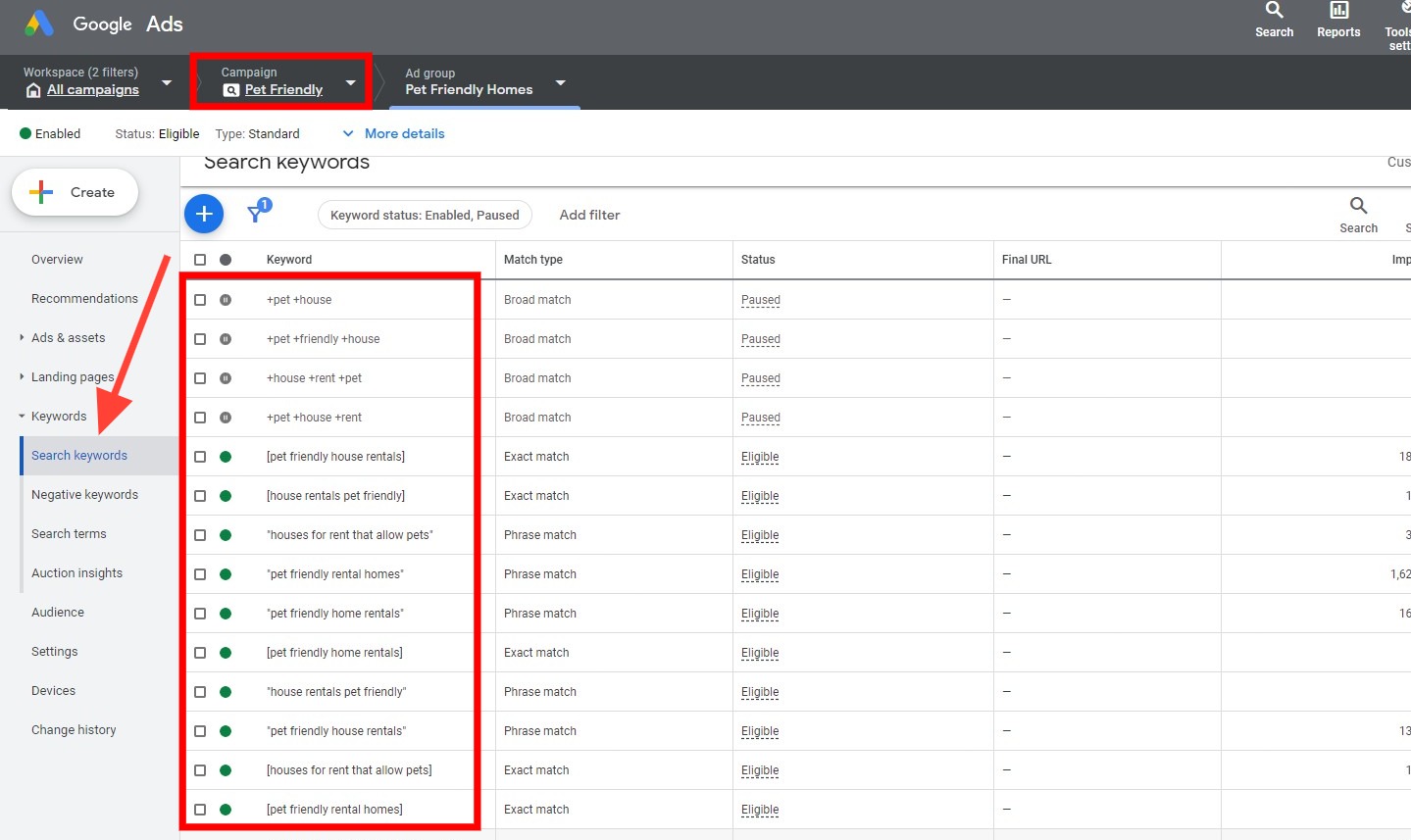
For apartment managers, this means diving deep into the language your ideal tenants use when seeking properties like yours. When selecting keywords, consider location, amenities, and apartment features.
- Conduct thorough research: When it comes to keyword research, it’s essential to be thorough. Use a keyword research tool to identify relevant keywords for your apartment marketing campaign. Consider not only the obvious keywords like “apartments for rent” but also long-tail keywords like “pet-friendly apartments for rent” or “luxury apartments with ocean view.”
- Localize your keywords: Since people search for apartments in specific locations, including location-specific keywords in your Google Ads is essential. Use location modifiers like city names, neighborhood names, or zip codes to attract the right audience.
- Check your competition: To stand out in the crowded apartment market, you must understand your competitors’ strategies well. Use a competitor analysis tool to identify which keywords your competitors are bidding on, how much they spend on their ads, and what their ad copy looks like.
- Focus on user intent: When choosing keywords for your apartment marketing Google Ads, consider the intent behind the user’s search. Are they looking for a specific apartment complex or just browsing for options? Ensure your ad copy aligns with the user’s intent and provides relevant information.
- Test and refine your keywords: Keyword research is an ongoing process, and it’s essential to regularly test and refine your keywords. Use Google Ads’ keyword performance data to identify which keywords drive the most clicks and conversions. Remove underperforming keywords and add new ones to improve your campaign’s effectiveness.
Ultimately, thorough keyword research ensures that your Google Ads campaigns are tailored to the needs and desires of your target audience, maximizing the chances of attracting high-quality leads and converting them into tenants. It’s about speaking the language of your potential tenants and making your property irresistible to them.
4. Set up location targeting
Location targeting is a powerful strategy to help apartment managers and owners reach their target audience more effectively.
Location targeting also allows you to customize your ad messaging based on the user’s location. For instance, you can use city-specific language in your ad copy to create a sense of familiarity and connection with your target audience.
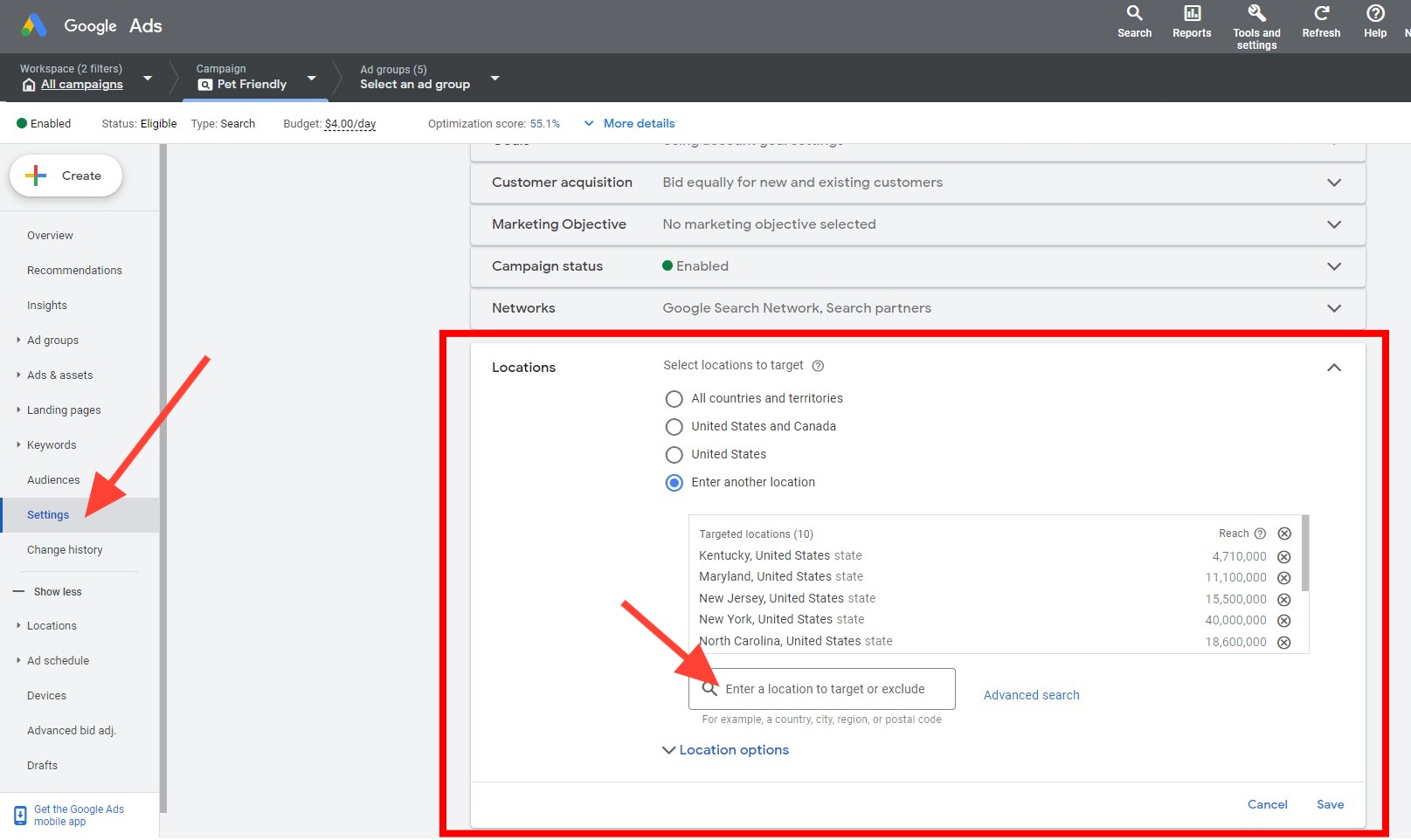
Here are some tips to help you optimize your marketing budget with proper location targeting:
- Know your target audience: Before setting up location targeting, ensure you clearly understand your target audience’s geographic location. Are they searching for apartments in a particular city or neighborhood? Use this information to target your ads to the right location.
- Choose the right location radius: When setting up location targeting, you can target a specific city or a radius around a particular location. Be sure to select the right radius for your target audience. For example, if you’re targeting a densely populated area, you may want to use a smaller radius.
- Customize your ad copy: Location targeting allows you to customize your ad copy based on the user’s location. Use city-specific language or mention nearby landmarks to create a sense of familiarity and connection with your target audience.
- Monitor your ad performance: Monitor your ad performance to see how your location targeting works. Use Google Ads’ location performance data to identify which locations are driving the most clicks and conversions. Adjust your location targeting as needed to optimize your campaign’s effectiveness.
- Use location bid adjustments: Location bid adjustments allow you to adjust your bids based on the user’s location. For example, if you’re targeting a highly competitive area, you may want to increase your bids to ensure your ads are shown to the right audience.
Location targeting is a must-have strategy for any apartment marketing campaign. It helps you reach your target audience more effectively, customize your ad messaging, and save money on your advertising budget. If you have difficulty choosing what locations to target, you can always use AI tools to manage your Google Ads account. You can use tools like ChatGPT and Bard to provide populations and overlay other helpful information to target your ads and maximize your ad spend.
5. Create ads that connect with your audience
In the competitive world of apartment marketing, apartment owners and managers must craft compelling responsive Google Ads copy that truly connects with their target audience. By creating emotionally resonating ads, you can pique the interest of potential tenants and motivate them to take action, be it by clicking on your ad or inquiring about your property.
One of the reasons why engaging ad copy is so important is that it enables you to stand out from the competition. With so many ads vying for a renter’s attention, the ability to capture their interest with persuasive and relatable messaging can make all the difference.
- Focus on the Unique Selling Points: Identify the aspects of your property that set it apart from competitors, such as unique amenities, prime location, or recent renovations. Highlight these features in your ad copy to grab the attention of potential tenants.
- Use action-oriented language: Encourage potential renters to take action by using robust and persuasive language, such as “schedule a tour,” “apply now,” or “discover your new home.” This can boost engagement and lead to higher click-through rates.
- Test different ad copy variations: Experiment with headlines, descriptions, and calls to action to determine which combination yields the best results. Continuous testing and optimization will help you refine your ad copy and maximize its effectiveness.
- Speak to your target audience: Craft ad copy that resonates with your ideal tenant by addressing their needs, desires, and preferences. Use language that appeals to them, and consider mentioning the aspects of your property that are most important to this demographic.
- Keep it clear and concise: You must convey your message efficiently with limited character counts in Google Ads. Use short, punchy sentences that communicate the value of your property, and avoid jargon or complicated phrasing that may confuse potential tenants.
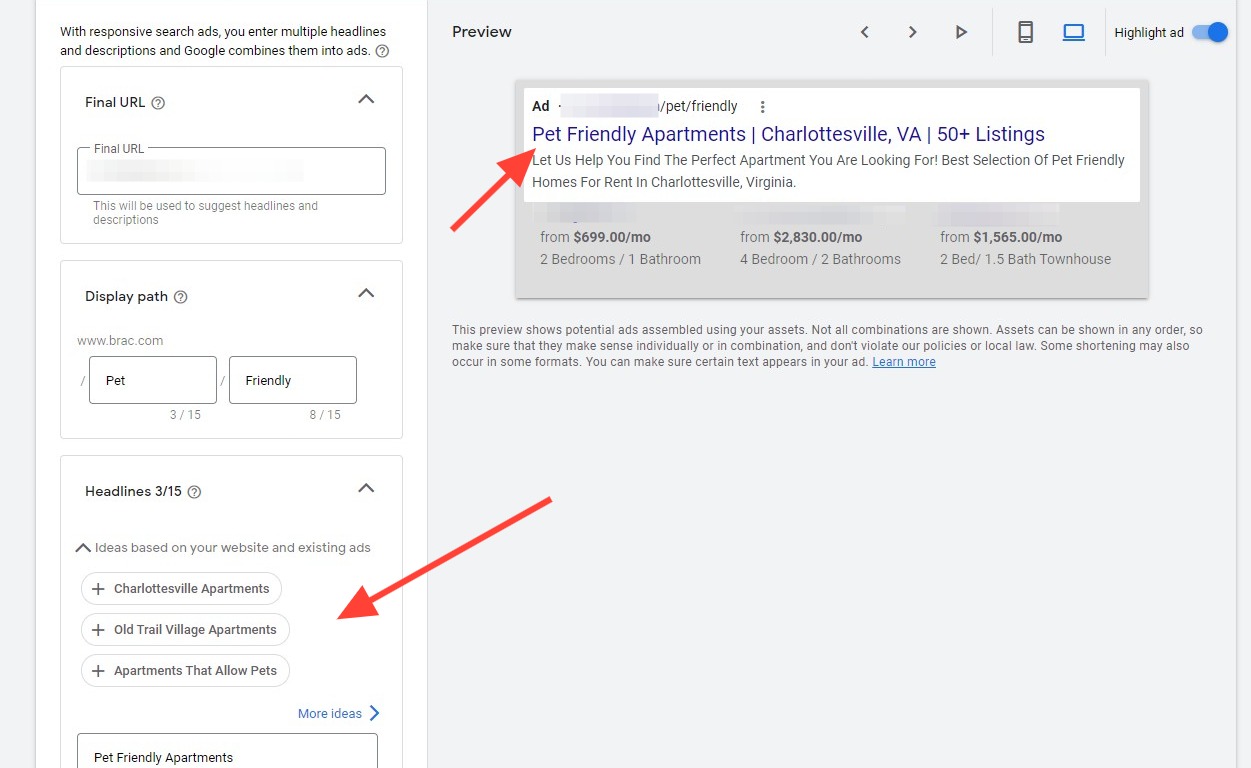
Moreover, compelling ad copy is essential for conveying the unique value proposition of your property. By effectively highlighting the benefits and features that set your apartments apart, you can position yourself as the best choice for potential tenants searching for their new homes.
Ultimately, writing ad copy that connects with your audience is key to driving results in your Google Ads campaigns.
By crafting memorable and persuasive ads, you can improve click-through rates, increase conversions, and maximize your return on investment, all while reinforcing your brand identity and fostering a deeper connection with your target market.
6. Optimize your landing pages
Optimizing landing pages is integral to any successful apartment marketing strategy utilizing Google Ads. A well-designed and efficient landing page not only increases the likelihood of converting potential tenants but also improves the overall performance of your ad campaigns.
A key reason why landing page optimization is essential is its impact on your Quality Score (QS) in Google Ads.
A high-quality landing page that is relevant to your ad copy and keywords can lead to better ad placements, lower cost-per-clicks, and more efficient ad spending.
- Ensure consistency with ad copy: Align the messaging and design of your landing page with your ad copy to provide a cohesive user experience. Consistency between ads and landing pages helps maintain user interest and increases the likelihood of conversion.
- Use clear and compelling headlines: Craft headlines that instantly communicate your property’s value proposition and grab potential tenants’ attention. Make sure the headline is clear, concise, and relevant to the ad that brought the user to your landing page.
- Showcase high-quality images and videos: Use visually appealing images and videos to highlight the best features of your property. This helps potential tenants visualize themselves living in your apartments and can encourage them to take the next step, such as scheduling a tour or submitting an application.
- Simplify the conversion process: Make it easy for potential tenants to take action by minimizing the number of steps required to complete a conversion, such as filling out a contact form or booking a tour. Streamline the process to reduce friction and improve the user experience.
- Test and optimize: Continuously test different elements of your landing page, such as headlines, images, and calls to action, to determine what works best for your target audience. Use data-driven insights to refine your landing page and maximize its effectiveness in driving conversions.
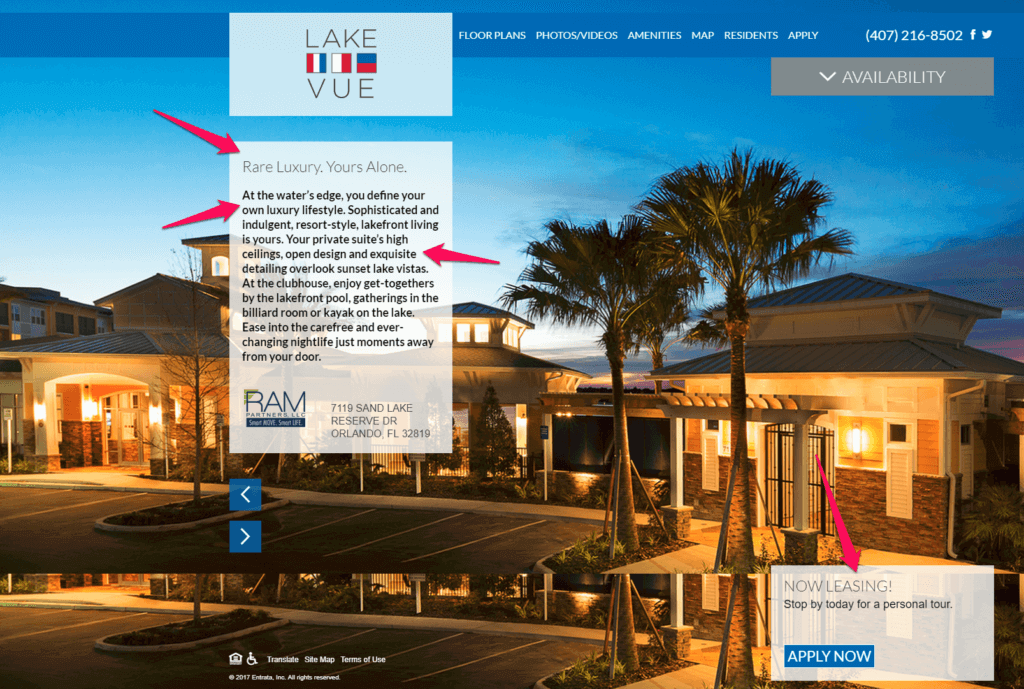
Moreover, an optimized landing page delivers a seamless and consistent user experience, which is critical in keeping potential tenants engaged.
By ensuring that your landing page’s messaging and design elements align with your ad copy, you can create a cohesive journey for the user, ultimately increasing the chances of conversion.
Optimizing your landing pages is a vital aspect of making Google Ads work for your apartment marketing strategy. Creating engaging and user-friendly landing pages that align with your ads can improve campaign performance, maximize return on investment, and secure more quality leads for your property.
7. Use ad extensions to drive results
Utilizing ad extensions is a powerful tactic for apartment owners and managers looking to maximize the effectiveness of their Google Ads campaigns. Ad extensions provide additional information and opportunities for engagement, enhancing the overall performance of your ads and driving better results for your apartment marketing strategy.
The key advantage of ad extensions is that they allow you to showcase more information about your property within the limited space of a text ad.
By incorporating extensions such as callouts, location, and structured snippets, you can provide potential tenants with valuable details that help set your property apart from the competition.
Location extensions
Location extensions are a valuable feature in Google Ads that allow apartment owners and managers to display their property’s address alongside their ad copy. By including location information, potential tenants can easily identify the property’s whereabouts and gauge its convenience based on their desired neighborhood or proximity to essential amenities.
Location extensions can lead potential tenants to your Google Maps listing, where they can access additional information, photos, and even reviews.
In essence, location extensions enhance your ad’s appeal and relevance, driving more qualified leads to your property.

Call extensions
Call extensions are a valuable feature in Google Ads that allow apartment owners and managers to display their phone numbers alongside their ad, making it easy for potential tenants to contact them directly.
By incorporating call extensions, you can streamline communication and increase the chances of converting interested renters.
The main benefit of call extensions is the convenience they provide to potential tenants. They can call your property and ask questions, schedule a tour, or discuss lease terms with just a click or tap.

Sitelink extensions
Sitelink extensions are a versatile feature in Google Ads that enable apartment managers and owners to add extra links to their ads, guiding potential tenants to specific pages on their website. By incorporating sitelink extensions, you can highlight key aspects of your property and offer a more comprehensive browsing experience.
The advantage of using sitelink extensions in apartment ads lies in their ability to showcase various features or amenities, such as floor plans, photo galleries, or community events.
These additional links allow potential tenants to easily access the information they’re most interested in, fostering engagement and increasing the likelihood of conversion.

Structured snippet extensions
Structured snippet extensions are an effective feature in Google Ads that allow apartment managers and owners to showcase specific attributes or aspects of their property in a concise, organized format.
By incorporating structured snippet extensions, you can provide additional context and details that make your ad more informative and appealing to potential tenants.
The benefit of using structured snippet extensions lies in their ability to highlight key features or selling points of your apartments, such as amenities, floor plans, or lease terms.
These snippets help paint a more complete picture of your property, encouraging prospective renters to explore further. By integrating structured snippet extensions, you can create more engaging and comprehensive ads that ultimately drive higher conversion rates and contribute to a successful apartment marketing campaign.

Promotion extensions
Promotion extensions in Google Ads are a powerful tool for apartment managers to attract qualified traffic to their websites.
These extensions allow you to showcase special offers, discounts, or promotions directly in your ads, enticing potential tenants to click and learn more. By highlighting incentives like move-in specials or limited-time discounts, apartment managers can effectively capture the attention of searchers and increase the chances of driving qualified leads to their website, ultimately boosting conversions and occupancy rates.

Price extensions
Price extensions are a valuable feature in Google Ads that enable apartment managers and owners to display pricing information alongside their ad, offering potential tenants a transparent view of the costs of renting a unit in their property. By incorporating price extensions, you can attract renters who are actively comparing rental prices in their search.
The advantage of using price extensions lies in their ability to showcase the affordability and value of your apartments. By providing clear pricing information, you can appeal to budget-conscious renters and make comparing options easier.
Price extensions can lead to higher engagement, better-qualified leads, and increased conversions, ultimately contributing to a successful apartment marketing campaign.
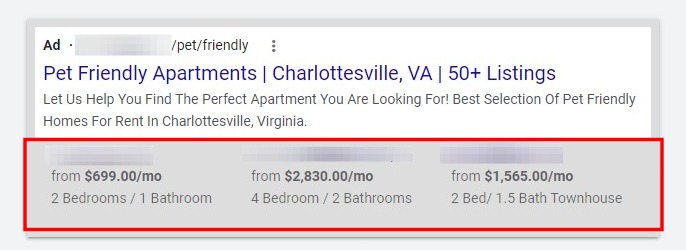
Let’s get your properties leased up
Optimizing Google Ads for apartments is crucial to maximizing the effectiveness of your marketing efforts and attracting quality leads.
You can create highly targeted and engaging campaigns that resonate with potential tenants by understanding your target audience’s needs, crafting compelling ad copy, optimizing your landing pages, and leveraging various ad extensions.
Ready to boost your apartment’s online presence and attract quality tenants? Look no further. StrategyBeam is your go-to partner for expert Google Ads management tailored specifically for apartments.
Stop wasting time and money on ineffective advertising. Our team of digital marketing specialists will optimize your Google Ads campaigns, maximizing your reach and generating qualified leads. Say hello to a steady stream of interested renters and increased occupancy rates.

